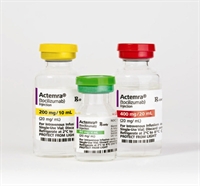 Product: Actemra
Product: Actemra
Company: Genentech
Pharmacologic class: Interleukin-6 (IL-6) receptor inhibitor
Active ingredient: Tocilizumab 20 mg/mL; solution for IV infusion after dilution; preservative-free.
Indication: Moderately to severely active rheumatoid arthritis (RA) in patients who have had an inadequate response to one or more tumor necrosis factor (TNF) blockers. May be used with methotrexate or disease modifying antirheumatic drugs (DMARDs).
Pharmacology: IL-6 is produced by monocytes and lymphocytes in the bloodstream and by synovial and endothelial cells in the joints, leading to systemic and local production of IL-6 in patients affected by inflammatory processes such as RA. Tocilizumab binds specifically to both soluble and membrane-bound IL-6 receptors and has been shown to inhibit IL-6-mediated signaling through these receptors.
Clinical trials: The efficacy and safety of tocilizumab was assessed in five randomized, double-blind studies in patients >18 years with active RA. Tocilizumab was given every four weeks as monotherapy (Study I), in combination with methotrexate (MTX) (Studies II and III) or other DMARDs (Study IV) in patients with an inadequate response to those drugs, or in combination with MTX in patients with an inadequate response to TNF antagonists (Study V). The primary endpoint was the proportion of patients who achieved an American College of Rheumatology (ACR) 20 response at Week 24. In all studies, patients treated with tocilizumab 8 mg/kg had statistically significant ACR20, ACR50, and ACR70 response rates versus MTX- or placebo-treated patients at Week 24. Patients with inadequate response to DMARDs or TNF antagonist therapy treated with tocilizumab 4 mg/kg had lower response rates compared with patients treated with tocilizumab 8 mg/kg.
Adults: Give once every four weeks as a 60-minute IV infusion. Initially 4 mg/kg, may increase to 8 mg/kg based on clinical response. Do not start if absolute neutrophil count (ANC) <2,000/mm3, platelets <100,000/mm3, or alanine transaminase/aspartate transaminase (ALT/AST) >1.5 upper limit of normal (ULN). Reduce dose to 4 mg/kg if elevated liver enzymes, neutropenia, or thrombocytopenia occur (see literature).
Children: Not recommended.
Precautions: ANC <500 mm3, platelets <50,000 mm3, or ALT/AST >5 ULN: not recommended. Monitor neutrophils, platelets, liver function tests every four to eight weeks. Active hepatic disease or impairment: not recommended. Hepatitis B or C virus or infection. Increased risk of serious or fatal infections (e.g., TB, bacterial sepsis, invasive fungal). Active infections: do not give therapy. Chronic or history of recurring or opportunistic infections. Conditions that predispose to infection. Travel to, or residence in, areas with endemic TB or mycoses. Test for and treat latent TB prior to starting therapy. Monitor closely if new infection develops; discontinue if serious or opportunistic infection or sepsis develops. Monitor lipids four to eight weeks after initiation, then every six months. Immunosuppression. Central nervous system demyelinating disorders. Malignancies. Elderly. Pregnancy (Cat. C). Nursing mothers: not recommended.
Interactions: Increased risk for infection with concomitant immunosuppressants (e.g., TNF antagonists, IL-1R antagonists, anti-CD20 monoclonal antibodies, selective co-stimulation modulators). Avoid live vaccines. Caution with CYP3A4 substrate drugs (e.g., oral contraceptives, lovastatin, atorvastatin). Monitor warfarin, cyclosporine, theophylline, other drugs that are CYP450 substrates with narrow therapeutic indices.
Adverse reactions: Upper respiratory tract infections, nasopharyngitis, headache, hypertension, increased ALT; infusion reactions, neutropenia, thrombocytopenia, gastrointestinal perforations, increased lipids.
Containment: Single-use vials (80 mg/4 mL, 200 mg/10 mL, 400 mg/20 mL)—1, 4